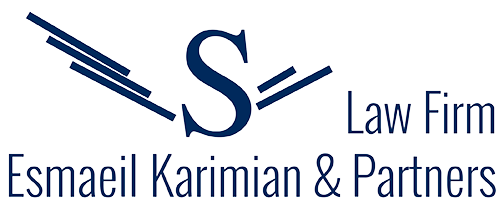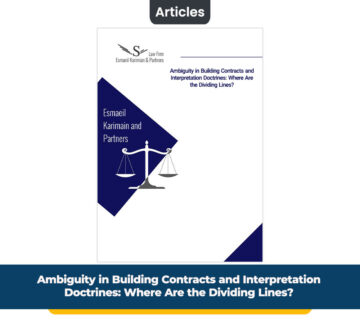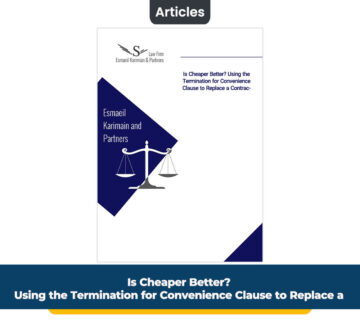In this article you will read:
Sixth Chapter: June 2017
Guarantee Instruments in Iran
Introduction
When a creditor intends to get a guarantee from a debtor in Iran, there are several options available to him. The level of protection that each guarantee provides, and its enforceability in case of breach of obligations by the debtor, are different depending upon which option is taken.
Below are more details about each type of guarantee.
1. Mortgage
A mortgage is a legal agreement that transfers the right of ownership of an asset or property from the debtor to the creditor with the condition that the conveyance of title becomes void on the payment of the debt by the debtor.
The mortgage contract is recognized by article 458-463 of the Iran Civil Code. This is considered to be one of the strongest available types of guarantee.
Since in a mortgage contract the debtor officially transfers the title of his property to the creditor and an official deed is issued, the debtor has to go through a difficult procedure to take the property back after settlement of his debt. Therefore, it is hard to convince a debtor to agree to such a guarantee.
2. Lien
A lien is a form of security interest granted over a property to secure the payment of a debt.
When a property is put under lien and the debtor has not settled his debts, the creditor is able to sell the property to take back his money.
A lien contract has to be registered by a notary public and certain costs should be borne.
This type of guarantee has the difficulty of enforcement in Iran. The creditor has to go through the litigation process and obtain a court order to be able to sell the property. Moreover, the debtor may be able to sell his property which creates a problem for the creditor.
3. Lien with Irrevocable Power of Attorney
In this sort of lien, the debtor issues an irrevocable power of attorney to the creditor to sell the property and take back his money. This power of attorney solves the problem of enforcement of lien and there is no need to obtain court order anymore.
Compared to a simple lien, this kind of guarantee provides a better degree of protection to the creditor’s interests. Many Iranian banks use this kind of guarantee when granting loans to clients.
4. Giving Irrevocable Power of Attorney
In this type of guarantee, the debtor issues an irrevocable power of attorney to the creditor and empowers him to sell the property on his behalf.
Although the cost of issuing such power of attorney is low, it does not secure the creditor’s interest properly. The debtor can easily sell the property before the creditor uses the POA and as a result, the POA becomes ineffective.
5. Promissory note
A promissory note is a signed document containing a written promise to pay a stated sum to a specified person or bearer at a specified date or on demand.
This type of guarantee is recognized under the commercial law of Iran and therefore it can be used as a guarantee of payment.
However, this guarantee is not common among businessmen anymore due to enforceability difficulties. The bearer of the promissory note has to go through a time-consuming litigation process to force the debtor to pay the amount under the promissory note. Therefore, it is not considered to be a suitable guarantee in Iran.
6. Check (cheque)
A check is a document that orders a bank to pay a specific amount of money from a person’s account to the person in whose name the check has been issued. It is also a recognized guarantee instrument under the commercial law of Iran and it is much more common amongst the businessmen of Iran compared to a promissory note.
A check provides stronger security than a promissory note since it can be enforced through the “State Organization for Registration of Deed and Properties” and noncompliance may also result in criminal conviction of the check’s drawer.
However, in case of nonpayment of the check’s amount by the drawer (debtor) the check beneficiary has to go through a time-consuming court procedure to force the debtor to settle the check’s amount.
Similarly, enforcing the check through the “State Organization for Registration of Deed and Properties” is expensive (10% of check amount must be paid to the Organization) and the beneficiary also needs to introduce an asset of debtor to be confiscated by the Organization.
At the same time, the debtor may be able to close his account and even obtain turnover of the debtor’s account before accepting a check which would not be helpful!
7. Bank Guarantee
A bank guarantee is a written promise from a bank that the liabilities of a debtor will be met in the event that he fails to fulfil his contractual obligations.
There are several kinds of bank guarantee available but the one which provides the strongest degree of protection of the creditors’ right is an “irrevocable, unconditional, on demand bank guarantee”.
By issuing a bank guarantee which is irrevocable, the debtor cannot close his account or cancel the guarantee and where the guarantee is “on demand”, the creditor is able to ask for the guarantee’s amount without needing to prove that there has been a breach of the contract by the debtor.
Conclusion
Comparing the above-mentioned guarantees, ‘Mortgages’, ‘Liens with a Power of Attorney’ and ‘Bank Guarantees’ provide the highest level of guarantee for a creditor in Iran.
On the other hand, it may be difficult to convince the debtor to accept a mortgage or even lien with POA. Therefore, the most desirable available guarantee would be a bank guarantee.





No comment